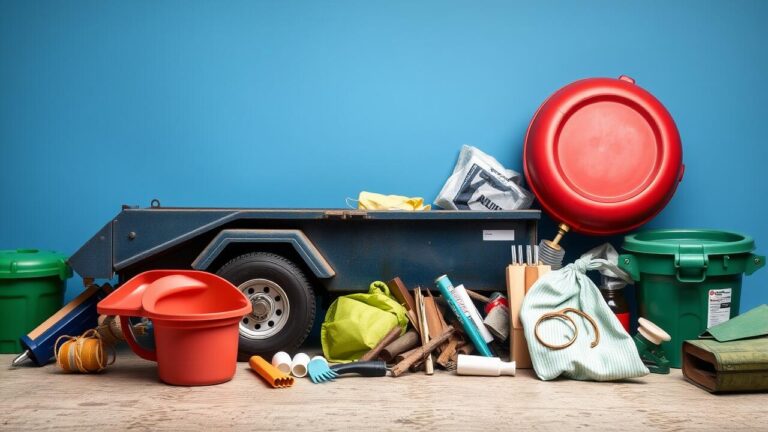What to Consider When Renting a Roll-off Dumpster
Understanding Local Regulations
Local regulations play a crucial role in the process of renting a roll-off dumpster. Different municipalities have specific guidelines regarding the types of materials allowed, weight limits, and duration for which a dumpster can be on your property. It’s essential to familiarize yourself with these regulations to avoid fines or delays. Ignorance of local laws can lead to unexpected penalties or the need to make last-minute adjustments to your project.
In addition to weight limits and types of waste, placement restrictions can also be important. Some areas may require that dumpsters be located only on private property, while others might permit them on public streets with proper permits. Obtaining necessary permits in advance can help streamline the rental process. Consulting with your dumpster rental company can provide clarification on local regulations as they often have experience with requirements specific to your area.
Permits and Restrictions for Dumpster Placement
When renting a roll-off dumpster, it’s essential to familiarize yourself with local regulations regarding permits and placement restrictions. Many municipalities require a permit for placing a dumpster on public property, such as streets or sidewalks. It’s advisable to check with your local city or county office to ensure compliance with any zoning laws and to understand the specific requirements in your area.
Placement restrictions may also include guidelines regarding the distance from intersections, driveways, or fire hydrants. Understanding these restrictions can help prevent potential fines and ensure that your dumpster does not obstruct public access or safety. Additionally, if you plan to place the dumpster on private property, consult with your homeowner’s association or property management to confirm any rules that may apply.
Planning for Delivery and Pickup
When renting a roll-off dumpster, timing can significantly impact your project’s efficiency. It’s crucial to consider the delivery and pickup schedules that align with your timeline. Check with the rental company about their availability to ensure you can secure the dumpster when you need it. Some companies may require advance notice for delivery, especially during busy seasons. Planning ahead will help you avoid delays and keep your project on track.
Coordination with the rental service for pickup is equally important. After loading the dumpster, notifying the company to arrange for timely collection prevents unnecessary clutter and ensures that waste is promptly removed from your site. It’s wise to confirm any specific procedures the rental company may have regarding scheduling. Being proactive about these details can lead to a smoother process and more efficient waste management throughout your project.
Scheduling Convenience for Your Project
When planning your project, it’s essential to consider the timing of dumpster delivery and pickup. Align these events with your project schedule to avoid delays. If the dumpster arrives too early, it may become a hindrance. Conversely, an overdue pickup can disrupt workflow as it occupies valuable space.
Communicating your timeline clearly with the rental company can ensure you receive the dumpster exactly when needed. Be sure to account for weekends and holidays, as these may affect service availability. Proper scheduling not only keeps your project organized but also contributes to a more efficient waste management process.
Preparing for Loading the Dumpster
Efficient loading of the dumpster is crucial for maximizing space and minimizing costs. Start by sorting through materials beforehand. Grouping recyclables, yard waste, and general trash will streamline the process. Place heavier items at the bottom and lighter materials on top. This method helps to maintain balance and prevents potential spillage.
Consider the type of waste you will be disposing of. Certain materials might require special handling or disposal techniques. For example, hazardous waste and electronic items typically cannot be placed in standard dumpsters. Familiarizing yourself with these restrictions is essential to ensure compliance with local regulations. Planning ahead will simplify the loading process and keep your project on track.
Tips for Efficient Waste Disposal
To maximize the efficiency of waste disposal, organization plays a crucial role. Begin by sorting materials before loading them into the dumpster. Separate recyclables like cardboard, metals, and plastics from general waste. This approach not only streamlines the loading process but also ensures that recyclable items are diverted from landfills. Consider using bags or bins for smaller items to keep everything tidy and manageable.
Positioning larger items strategically can also enhance space utilization within the dumpster. Place heavy and bulky materials at the bottom to create a stable base. Utilize all available vertical space by breaking down boxes or disassembling furniture when possible. By taking these steps, you can make the most of the dumpster’s capacity while contributing to a more effective waste management process.
Considering Environmental Impact
Waste management practices have a significant impact on the environment. Choosing to rent a roll-off dumpster often presents an opportunity to consider how your waste is handled. Many rental companies offer recycling options, allowing a portion of collected materials to be repurposed. This not only reduces landfill contributions but also decreases the extraction of new raw materials, promoting a more sustainable approach to waste disposal.
Thinking about the environmental footprint of your project can influence the type of materials you dispose of. It is essential to separate recyclables from non-recyclables and to avoid placing hazardous materials in the dumpster. Properly educating yourself on local recycling guidelines can enhance your efforts in minimizing environmental impact. Making responsible choices in waste disposal contributes to a healthier community and a cleaner planet for future generations.
Responsible Disposal and Recycling Options
When renting a roll-off dumpster, it’s important to consider how to dispose of waste responsibly. Many cities have regulations regarding what can and cannot be placed in a dumpster. Items like hazardous materials, electronics, and certain types of construction debris may require special handling or separate disposal methods. Research local guidelines to ensure compliance and avoid any potential fines.
Recycling is a significant aspect of responsible waste management. Many rental companies offer services that help divert recyclable materials from landfills. Cardboard, metal, and certain plastics can often be recycled if sorted correctly. By taking the time to separate these materials before loading them into the dumpster, you contribute to a more sustainable waste disposal process and minimize your project’s overall environmental footprint.
FAQS
What factors should I consider when choosing a roll-off dumpster size?
When choosing a roll-off dumpster size, consider the volume of waste you expect to generate, the type of materials you’ll be disposing of, and the space available for the dumpster on your property. Common sizes range from 10 to 40 yards, so estimate your needs carefully.
Do I need a permit to place a dumpster on the street?
Yes, in many areas, a permit is required to place a dumpster on the street or public property. Check with your local government or waste management authority to determine the specific regulations and obtain any necessary permits.
How far in advance should I schedule my dumpster rental?
It’s advisable to schedule your dumpster rental at least a week in advance, especially during busy seasons. This allows you to ensure availability and coordinate delivery and pickup times that align with your project schedule.
What items are typically prohibited from being placed in a roll-off dumpster?
Prohibited items often include hazardous materials (like chemicals and batteries), electronics, medical waste, and certain appliances. Always check with your rental company for a complete list of restrictions to avoid additional fees.
How can I make the most of my dumpster rental for efficient waste disposal?
To maximize the efficiency of your dumpster rental, sort your waste beforehand, load heavier items first, and avoid overfilling the dumpster. Additionally, consider recycling materials when possible to reduce the overall waste sent to the landfill.







